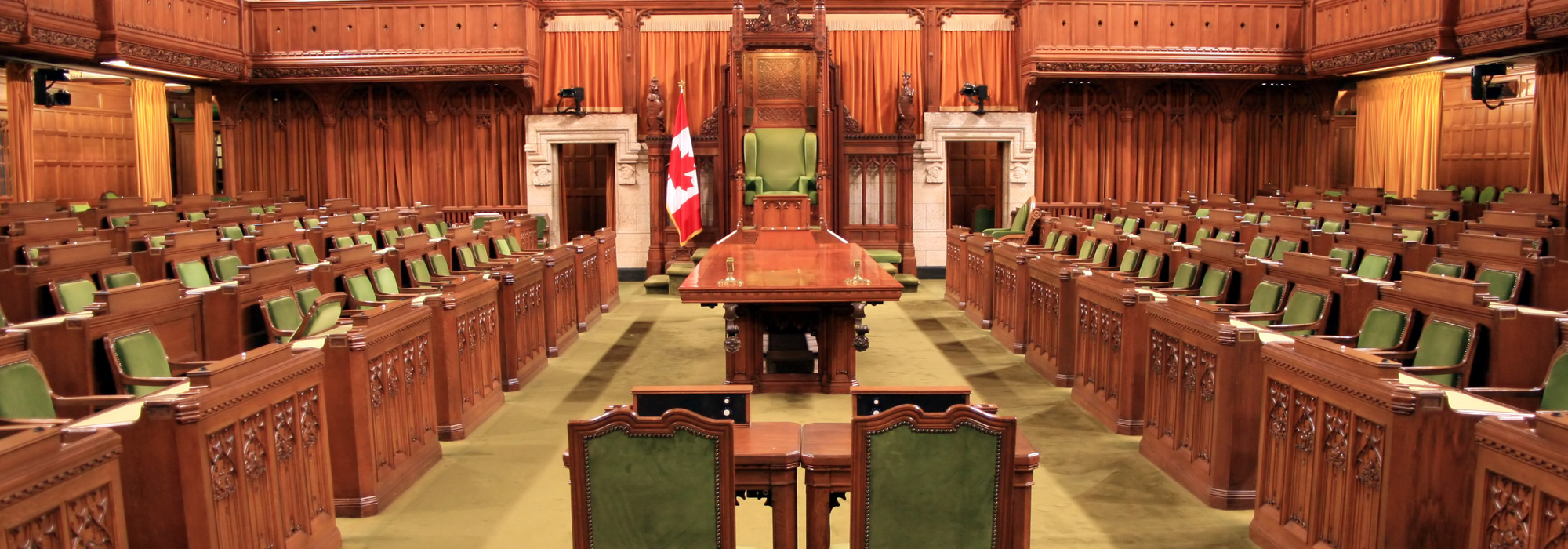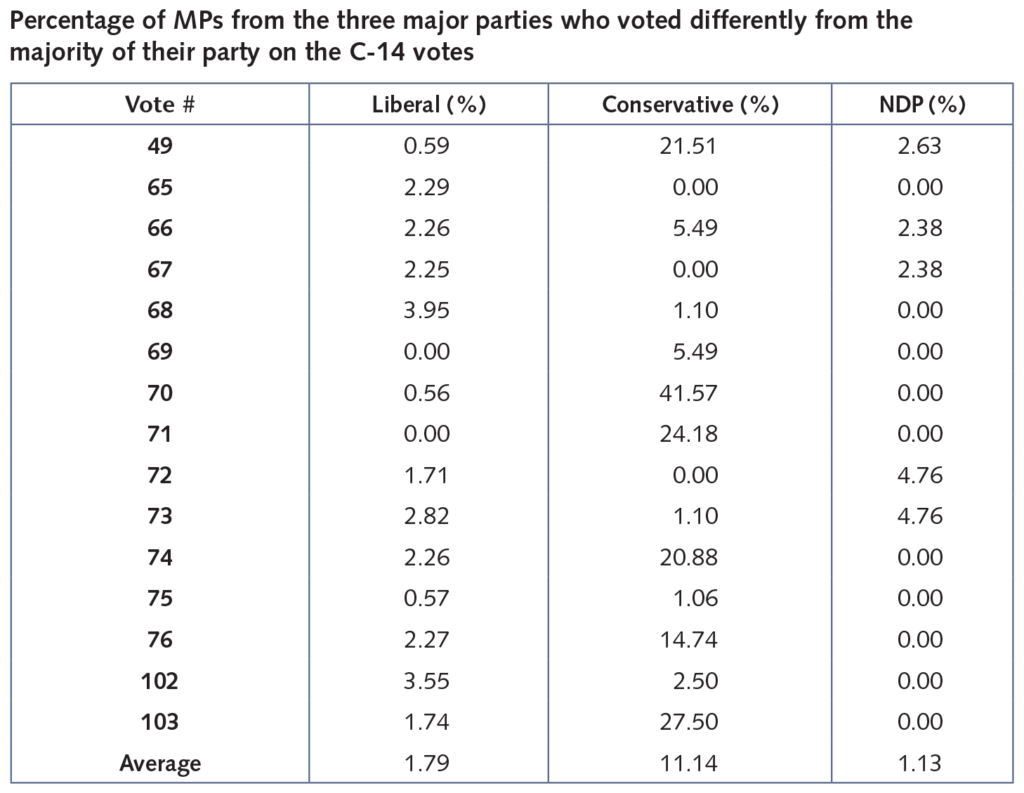
The partisanship in Canada’s Parliament is a curious thing. Thoughtful, knowledgeable and well-educated members of Parliament (MPs) almost always vote along party lines. One might suppose, given the breadth of complex issues we deal with, the intellectual diversity that we know exists in every party, and the importance of most issues on which we vote, that thoughtful MPs would break with their parties at least some of the time. Yet, the level of deviation from the majority in each party is extremely low.
Most of the public discussion around this phenomenon emphasizes the heavy hand of the whips or the Prime Minister’s Office enforcing their will on MPs. The prevailing narrative suggests that MPs are either directly forced to vote with their party, or they are bullied through heavy-handed incentives — potential denial of a nomination, removal from desired committees, loss of an opportunity for subsequent promotion, etc. Yet, in this Parliament, the 42nd, we have already had several free votes. Also, two of three major parties are headed by interim leaders, who lack most of the ordinary mechanisms for enforcing their will on MPs. In spite of that fact, even on free votes, almost all the MPs in most parties still voted in party blocs. Perhaps this suggests that the prevailing narrative — that partisanship is the result of heavy-handed authority — misses the mark.
A good way to demonstrate how MPs conform, even when the whip is not involved, is in the series of votes that took place around one particular piece of legislation, Bill C-14. This Bill dealt with medical assistance in dying, and raised a whole host of morally and legally complex issues. In the spring of 2016, the House voted on C-14 and related amendments, at different stages and for different versions of the Bill, 15 times, not including votes related to time allocation on the Bill. The amendments raised a wide variety of issues related to the Bill – eligibility criteria, safeguards, review processes, etc. Yet, throughout this process, the three major parties generally voted as blocs. The following table shows the percentage of MPs from each of the three major parties who voted differently from the majority of their party on the C-14 votes.
Many interesting trends are evident in this data. Clearly, the rate of deviation is much higher in the Conservative caucus, although even there the number is skewed significantly upward by one highly unusual vote, number 70, in which the caucus split almost 50/50. NDP MPs almost always voted together, in spite of the free votes and the absence of a permanent leader. Liberal MPs, with a large caucus, almost always had a small number of outliers, but still had a very low percentage of deviation (98 percent support, on average). How can it be explained that MPs, especially Liberals and New Democrats, generally aligned their votes with their colleagues, even though they did not have to?
There are many possible explanations for this phenomenon. One possibility is candidate selection: parties select candidates either who have a strong inclination to conformity or whose views all line up. Another explanation is reliance on expertise: most MPs do not have the time or energy to evaluate deeply every single vote in front of them, so they line up behind others who have done the detailed research and evaluation and whose worldview they assume they share. A third possible explanation is that MPs are behaving strategically in order to maximize their chances of re-election. They do not have to conform, but they are conforming because they see the presentation of a united front as strategically useful for their party, and therefore for themselves. A fourth and final possible explanation is simply natural conformity: people, whether politicians or not, generally find ways of justifying their desire to conform to those around them. If all your friends are drinking beer, you’re less likely to ask for a cooler.
It might be reasonable to suppose that parties would seek a certain inclination towards conformity among their candidates. There certainly are things about the political process that tend to exclude the most contrarian personalities. But then again, candidates are generally selected through nominations at the local level. In my experience, appearing to be overly conformist is actually a negative in the context of a local nomination. Voters want to know that you will stand up for them in Ottawa, regardless of the party whip or the inclinations of your colleagues. Despite a few high profile cases of party interference in nominations, candidate decisions are almost always made at the local level. So, at best, there is some “push-me pull-you” when it comes to whether naturally conformist personalities are nominated to be party candidates. Therefore, I do not put much stock in the candidate selection explanation for why MPs tend to conform.
MPs relying on experts within their party to direct their votes probably does play some role in the conformity we see. MPs generally have a huge amount of constituency work to manage – enough to fill their time, even before they get started on legislative and policy work. Even though the principle reason we are elected is to scrutinize legislation and policy, MPs often rely on their colleagues’ opinions because they simply do not have the time with all their constituency obligations to dig into every issue. And particularly on the assisted dying issue, the breakneck timeline created by the Supreme Court’s decision in the Carter case, as well as certain government decisions, made detailed scrutiny by individual MPs that much more difficult.
Yet, in the case of assisted dying votes, the experts were actually more likely to defect from the majority. In the Liberal caucus, Rob Oliphant, the chair of the special committee that studied the issue, vocally opposed the final draft of the legislation. Michael Cooper, who was the only Conservative MP who formally sat on both the special committee and the Commons justice committee that reviewed the legislation, voted against the majority in his party 4 out of 15 times, a relatively high level of deviation, even compared with the higher Conservative deviation average. It is hard to square the expert theory with the fact that MPs were more likely to be voting with their party’s front bench than with the person in their party who had been most involved with the parliamentary process.
The strategic behaviour explanation for conformity may have some basis in fact, since a lack of conformity could theoretically be perceived as a sign of party weakness and incoherence. But the prevailing public discussion on this issue seems to suggest that hyperconformity is not actually a good political strategy. Parties are often criticized for being highly conformist. They seem to recognize this to some extent and, during elections, they routinely promise to strengthen the independent representative role of MPs. Given the evident public demand for more MP independence, being overtly conformist would not seem to be a very good political strategy. Thus, strategic behaviour does not seem sufficient to explain conformity.
I give the most credence to the natural conformity explanation. MPs conform because that is, generally, what people do — they do what their friends and compatriots are doing, on things large and small. Of course, votes that happen in the House of Commons are often on matters of deep moral and practical significance. MPs almost never directly choose to vote against the dictates of their consciences in order to conform. Instead, they find ways of interpreting the dictates of their consciences in ways that allow them to conform to the voting patterns of their colleagues.
In light of my personal opposition to C-14, I tried to persuade as many Liberal MPs as possible to vote against it. Clearly, I was not very successful, but I discovered something quite interesting through these conversations. The more liberal-minded Liberal MPs declared that, while they wished the Bill had gone further, they were willing to support it as a positive step toward a more permissive assisted dying regime. More conservative-minded Liberal MPs said that this Bill was the best they could hope for, and that they were going to support it in order to prevent the introduction of something worse. In the Liberal caucus, most MPs supported the Bill, but often it was for opposing reasons. Some were voting for the Bill because it was a step toward something more. Others were voting for it because it was a bulwark against something more. Naturally, it could not be both.
It seems reasonable to suppose that all of these MPs were sincere in their reasoning, but they were also quietly influenced by the natural human desire to conform. (As it happens, I voted with the majority in my party for all 15 of the votes.) In my view, good moral reasoning looks at questions like how to vote on particular matters through a lens unclouded by social pressure. But decisions in the real world are always made in the context of social and emotional factors. David Hume said, “Reason is, and ought only to be the slave of the passions.” This makes it easier to understand how Liberal MPs with opposite points of view would end up voting the same way, with sincere motivations.
Many Canadians, it seems, are interested in seeing less partisanship. They want MPs to act more independently and to represent their constituents. The solutions that are often suggested involve reducing the power of party leaders and of party whips. However, my experience so far suggests that these solutions may miss the mark. MPs are not conforming because they are whipped. They tend to conform even when they are not whipped. Instead, it seems that MPs too often allow their process of reasoning to be clouded by the natural human desire to conform. The solutions most likely to make a difference, therefore, would be ones that change the culture of Parliament Hill so conformity is de-emphasized and independent reasoning by elected officials is encouraged.
Photo: I. Pilon / Shutterstock.com
Do you have something to say about the article you just read? Be part of the Policy Options discussion, and send in your own submission. Here is a link on how to do it. | Souhaitez-vous réagir à cet article ? Joignez-vous aux débats d’Options politiques et soumettez-nous votre texte en suivant ces directives.







